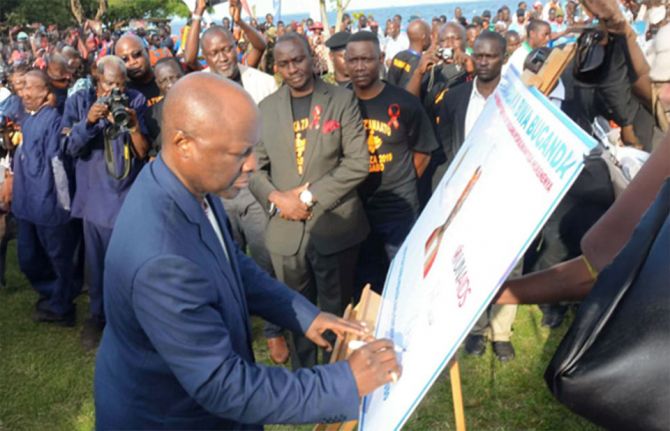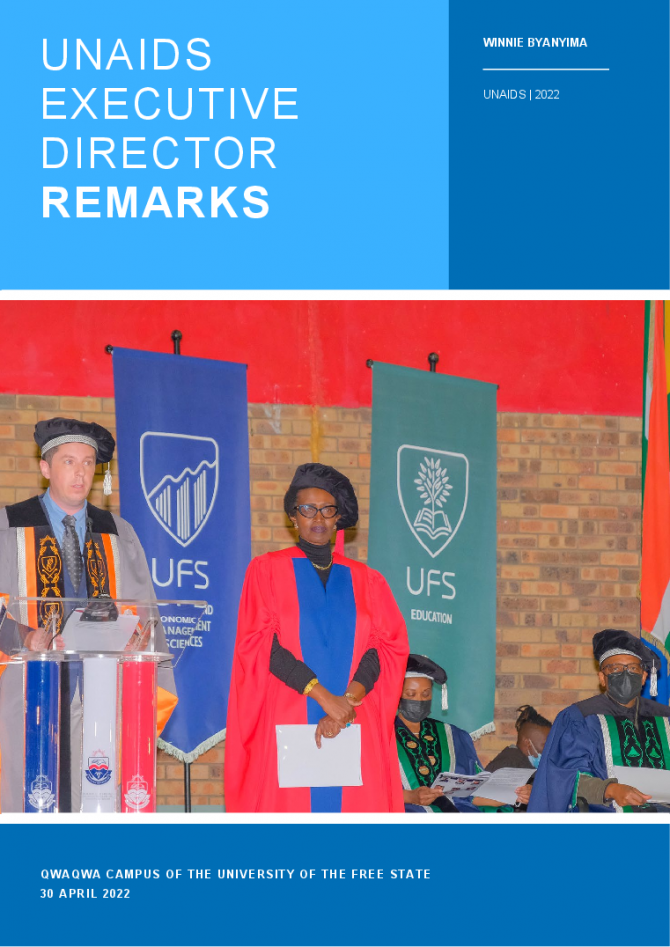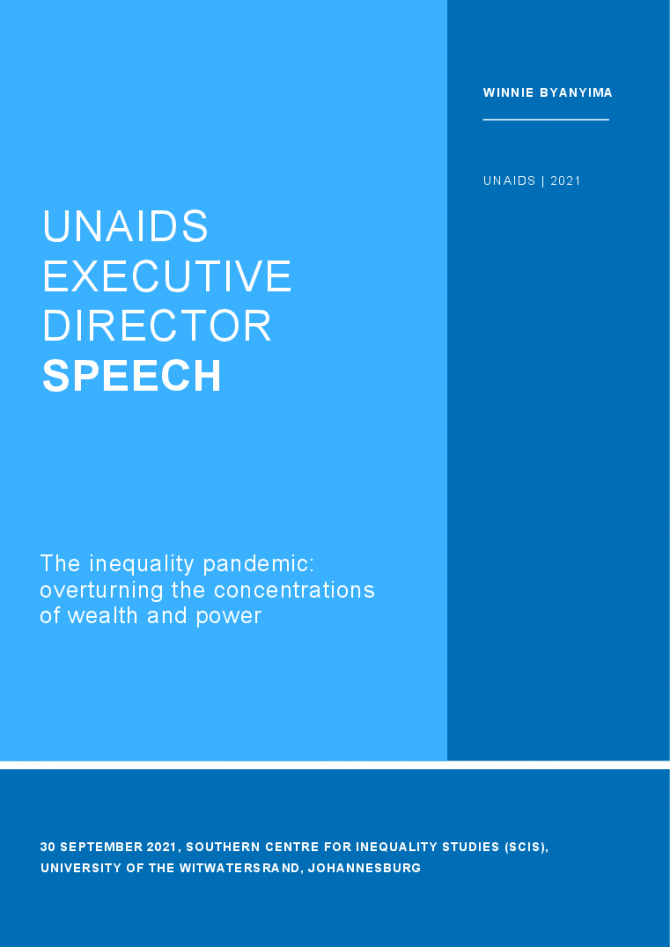
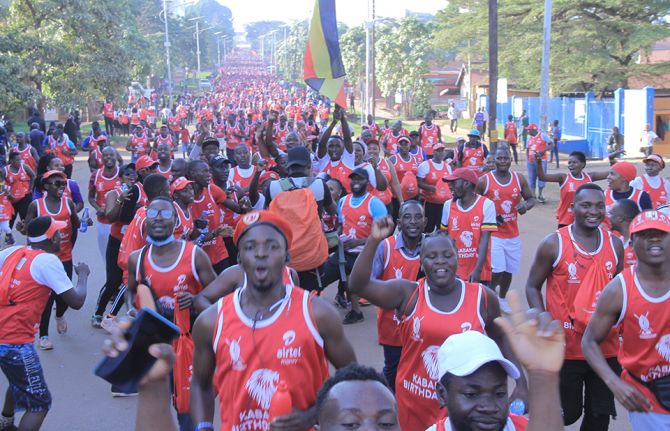
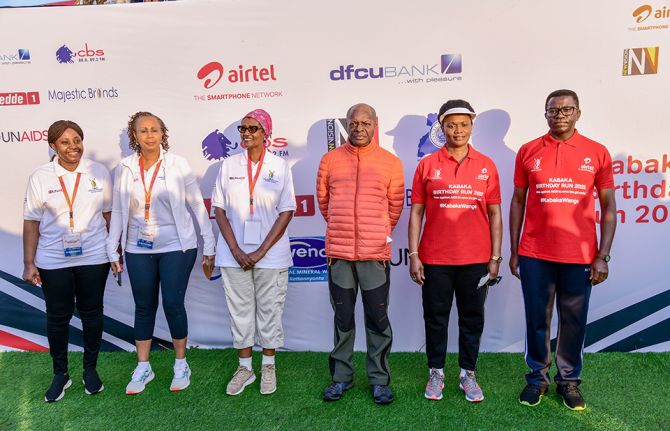
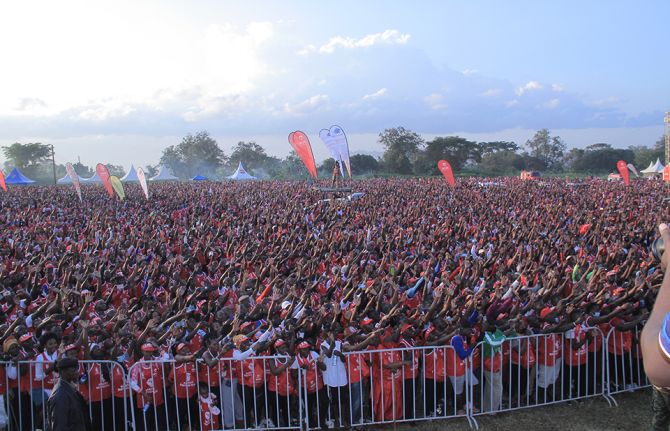
Feature Story
Thousands take part in the Kabaka Birthday Run to support the HIV response in Buganda
04 July 2022
04 July 2022 04 July 2022An estimated 80 000 people have taken part in the Kabaka Birthday Run, an annual event that forms part of the celebrations to mark the birthday of Kabaka Ronald Muwenda Mutebi II of Buganda. For the last three years, the run’s theme has been “Men for Good Health and Ending AIDS by 2030.”
The run is part of the Kabaka’s five-year campaign to increase the uptake of HIV testing and treatment services, with a particular focus on men and boys. It has yielded remarkable results in the Buganda region, with new HIV infections down more than in any other region of Uganda over the last few years.
The campaign is called “Men are Stars - Abaami Munyeenye” and connects men and boys aged 15—49 years old to HIV testing, treatment and care services, especially in the areas most affected by the pandemic. Through events such as the Kabaka Birthday Run, the Masaza football cup, the royal boat regatta, traditional campfire centres, school camps, radio and television shows, men and boys learn about the importance of going for regular health check-ups, including for HIV testing.
UNAIDS Executive Director, Winnie Byanyima, who attended the run in Mengo paid tribute to the Kabaka’s contribution to reducing the impact of HIV in Buganda.
“Your Majesty, under your leadership and through your messages to men and boys, Buganda has made remarkable progress against the AIDS pandemic in the last five years,” said Ms Byanyima, “UNAIDS looks forward to strengthening our partnership to reach other vulnerable groups such as young women and adolescent girls and to get Africa on track to end AIDS as a public health threat by 2030.”
In recognition of his significant contribution to the AIDS response, Ms Byanyima confirmed the Kabaka in his role as UNAIDS Africa Goodwill Ambassador.
Region/country
Related

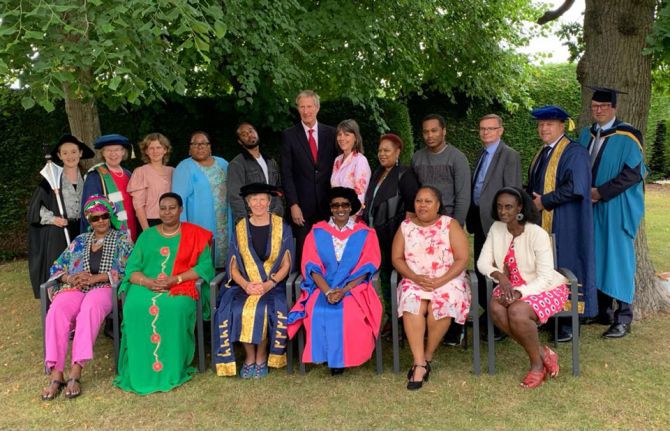
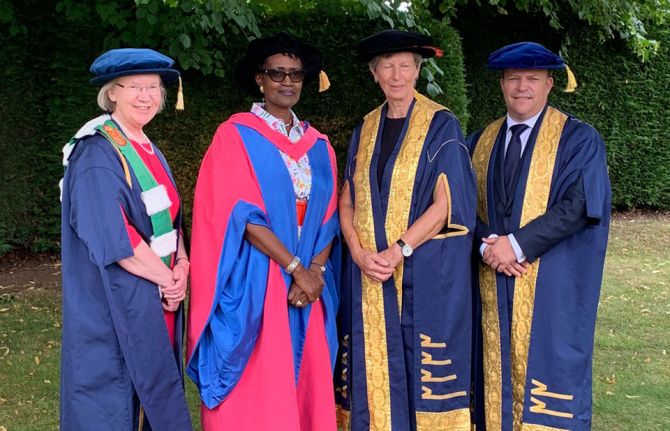


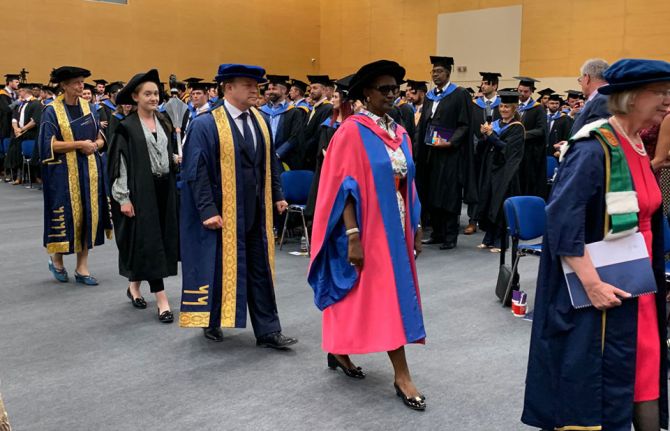
Press Release
UNAIDS Executive Director Winnie Byanyima receives Honorary Doctorate from Cranfield University
23 June 2022 23 June 2022Geneva, 23 June 2022—The Executive Director of UNAIDS Winnie Byanyima, has been conferred with an Honorary Doctorate from Cranfield University at a ceremony held on 23 June 2022 at its campus in Bedfordshire, United Kingdom.
“Receiving an Honorary Doctorate from my alma mater Cranfield University is such a huge honour!” said Ms Byanyima. “I have not been a practicing engineer for a long time—but what I learnt at Cranfield on applying science and technology in the service of humanity has stayed with me all my life.”
A passionate and longstanding champion of social justice and gender equality, Ms Byanyima believes that health care is a human right and has been an early champion of the People’s Vaccine Alliance, a coalition working to ensure that COVID-19 vaccines and treatments are available and free of charge to everyone, everywhere.
"Winnie is an exceptional person, making a huge difference to people right around the world,” said Chief Executive and Vice-Chancellor of Cranfield University, Professor Karen Holford CBE FREng. “I am really delighted to be honouring her in this way, particularly given her previous studies at Cranfield University. Our connection now continues, and I know that many of today’s graduates will look up to Winnie and aspire to make positive change in the world, just as she has.”
Ms Byanyima gained a Master of Science degree in mechanical engineering from Cranfield University in 1989.
Cranfield is a specialist postgraduate university in the United Kingdom, that is a global leader in education and transformational research in technology and management.
UNAIDS
The Joint United Nations Programme on HIV/AIDS (UNAIDS) leads and inspires the world to achieve its shared vision of zero new HIV infections, zero discrimination and zero AIDS-related deaths. UNAIDS unites the efforts of 11 UN organizations—UNHCR, UNICEF, WFP, UNDP, UNFPA, UNODC, UN Women, ILO, UNESCO, WHO and the World Bank—and works closely with global and national partners towards ending the AIDS epidemic by 2030 as part of the Sustainable Development Goals. Learn more at unaids.org and connect with us on Facebook, Twitter, Instagram and YouTube.

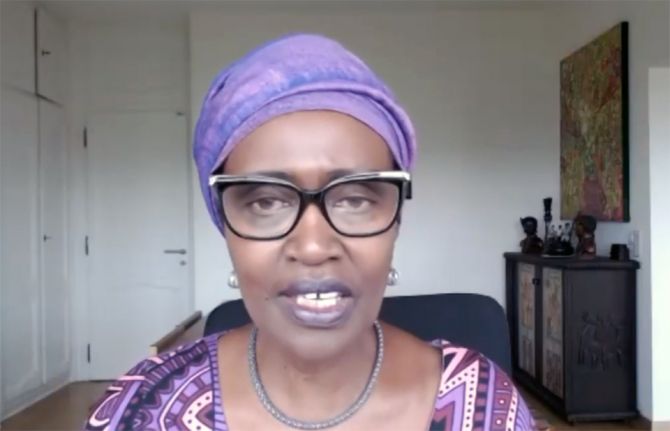
Press Release
World Health Assembly: UNAIDS urges leaders to tackle inequalities and fully embrace human rights to beat emerging pandemics
24 May 2022 24 May 2022GENEVA, 24 May 2022— At the seventy-fifth World Health Assembly, taking place in Geneva, Switzerland, UNAIDS has urged leaders to tackle the global inequalities that drive pandemics such as HIV and COVID-19. UNAIDS highlighted that respect for everyone’s human rights is essential for achieving health for all.
In her address to the World Health Assembly today, the UNAIDS Executive Director, Winnie Byanyima, urged leaders to urgently prioritize the investments needed to stop the AIDS pandemic as well as better prepare the world for future pandemics and ensure health security for everyone.
“The world remains dangerously unprepared to stop today’s pandemics or prevent those of the future because we lack effective plans to ensure access to health technologies and finance trusted community-led organizations for pandemic response,” said Ms Byanyima. “We can beat pandemics and we can protect the health of all if we are bold in tackling inequalities, if we place human rights at the centre of our response.”
Ms Byanyima’s speech touched on three main areas of pandemic preparedness: access, financing and communities.
Communities: to defeat pandemics and protect the health of all people, we need sufficiently financed community-led organizations providing services, doing outreach and providing trusted information as an integral part of the public health response. Communities, who know the situation on the ground best and have the essential relationships of trust, need to be given the resources and the space to lead.
Access: to end AIDS, beat COVID-19 and stop the pandemics of the future, global access to life-saving, pandemic-ending health technologies is critical. We need to replace intellectual property rules that restrict access to life-saving medicines for people in the Global South with those that require technology sharing. This would open up access to COVID-19 vaccines and treatments and to new emerging long-acting medicines for HIV prevention and treatment, as well as for medicines for other pandemics.
Financing: our collective health security, and the effectiveness of global pandemic responses, requires that we adequately finance them. This includes fully funding the Global Fund to Fight AIDS, Tuberculosis and Malaria. This means too that low- and middle-income countries need to be able to increase health investments through progressive domestic resource mobilization and international solidarity, not be shackled by debt or marginalized in the allocation of the International Monetary Fund’s Special Drawing Rights.
During the World Health Assembly, UNAIDS applauded the progress made in developing a new pandemic preparedness and response instrument and submitted that it should include the following essential substantive elements:
- Placing human rights at the core of pandemic responses.
- Putting communities at the centre, including participation in pandemic preparedness and response architecture at the national, regional and global levels.
- Ensuring access to health technologies and medical countermeasures as public health goods to allow equitable access by all those in need.
- Building people-focused data systems capable of highlighting inequalities.
- Supporting the health workforce, including community health workers on the pandemic front lines.
UNAIDS also warmly congratulated Tedros Adhanom Ghebreyesus on his reconfirmation as Director-General of the World Health Organization during the World Health Assembly. “Congratulations my brother Tedros! We look forward to continuing our work together to ensure health for all,” said Ms Byanyima.
UNAIDS
The Joint United Nations Programme on HIV/AIDS (UNAIDS) leads and inspires the world to achieve its shared vision of zero new HIV infections, zero discrimination and zero AIDS-related deaths. UNAIDS unites the efforts of 11 UN organizations—UNHCR, UNICEF, WFP, UNDP, UNFPA, UNODC, UN Women, ILO, UNESCO, WHO and the World Bank—and works closely with global and national partners towards ending the AIDS epidemic by 2030 as part of the Sustainable Development Goals. Learn more at unaids.org and connect with us on Facebook, Twitter, Instagram and YouTube.

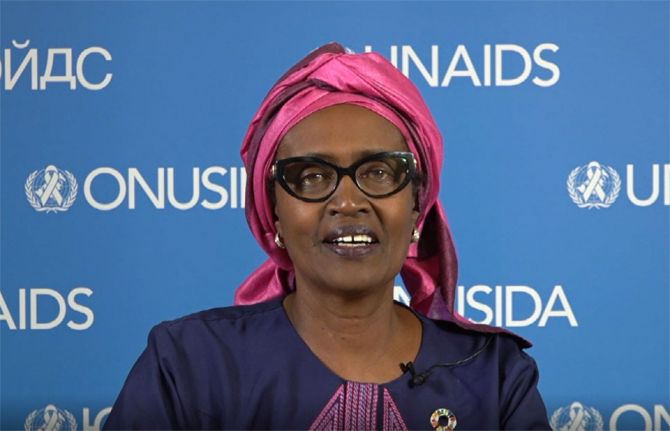
Opinion
UNAIDS Executive Director addresses first Arab Forum for Equality
30 May 2022
30 May 2022 30 May 2022The first Arab Forum for Equality, held in Amman on 30-31 May 2022, is organized by the ESCWA and the Pathfinders for Peaceful, Just and Inclusive Societies, and hosted by the Center on International Cooperation at the New York University. This is the inaugural meeting of the Forum, and the theme this year is “Towards inclusive youth employment in the Arab region”.
Following is UNAIDS Executive Director Winnie Byanyima’s address:
Greetings to all participants at this first and vital Arab Forum for Equality.
Thank you my dear sister, Rola Dashti, Executive Secretary of the United Nations Economic and Social Commission for Western Asia for inviting me.
I’ll share three lessons that we’ve learnt about inequality.
The first lesson is a worrying one: that inequality which was already extreme is being exacerbated even further.
In 2022, nearly half of humanity, 3.3 billion people are projected to be living below the poverty line of 5.50 USD a day. (Source: Oxfam)
New Oxfam estimates show that over a quarter of a billion more people could be pushed into extreme poverty in 2022.
A new billionaire has been created every 26 hours since the pandemic began. The world’s ten richest men have seen their fortunes double. (Oxfam)
A year and a half since the first doses of a COVID vaccine were delivered, 78% of people in the US are fully vaccinated, 69 % in Europe but still under 50% (46.26%) of people in the Arab region. (Our World in Data).
We also see huge inequalities within the Arab region. United Arab Emirates has reached 97% Covid vaccination. But it is a health emergency that Algeria is only at 15 % and Yemen at just 2.2%. (Our World in Data)
Since the onset of COVID19, wealth inequality has considerable increased in the Arab region, with the richest 10% of the population now controlling more than 80% of total regional wealth. (ESCWA)
Social protection expenditures among developed countries in the Arab States are just 4.2 per cent of GDP, lagging far behind the world average of 20 per cent. (ILO)
On average health expenditure across the Arab World is just 5% of GDP, nearly half that of the European Union (9.92%). (World Bank)
The second lesson is even more worrying: that we won’t be on track to overcome health or economic crises until inequalities come down.
These kinds of extreme, intersecting, inequalities increase the risks our societies face from pandemics such as AIDS and COVID-19. And we’ve seen with COVID just how quickly a health crisis is turned by inequalities into becoming a social, a political, an economic crisis.
The third lesson is a hopeful one, but that hope depends on action: inequalities are a political choice. Courageous leaders can tackle inequalities
We can close tax loopholes and tax holidays for companies.
We can go beyond the 15% tax rate agreement for all corporate taxation around the world, up to 25%.
We can ensure taxes are paid where economic activity happens.
We can increase investment in health, education and social protection.
We can reform laws and policies so that they help us reduce harm and risk, not worsen it.
We can change the global trade rules which kept life-saving vaccines locked up in the North
Inequality is a crisis but it is not fate, tackling it is within our hands.
UNAIDS
The Joint United Nations Programme on HIV/AIDS (UNAIDS) leads and inspires the world to achieve its shared vision of zero new HIV infections, zero discrimination and zero AIDS-related deaths. UNAIDS unites the efforts of 11 UN organizations—UNHCR, UNICEF, WFP, UNDP, UNFPA, UNODC, UN Women, ILO, UNESCO, WHO and the World Bank—and works closely with global and national partners towards ending the AIDS epidemic by 2030 as part of the Sustainable Development Goals. Learn more at unaids.org and connect with us on Facebook, Twitter, Instagram and YouTube.
Related
 Government ensures continuity of treatment in Malawi
Government ensures continuity of treatment in Malawi

10 February 2025

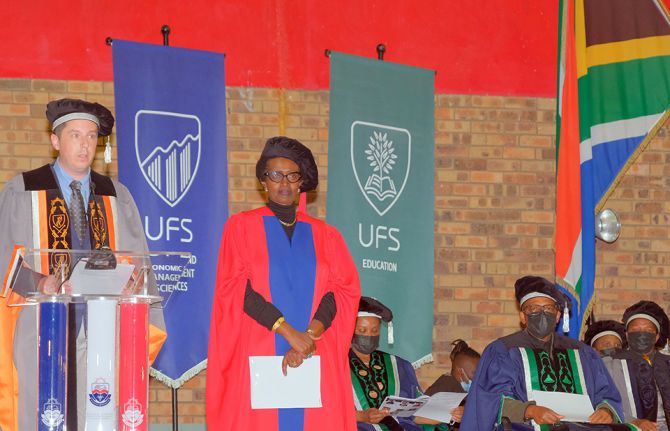
Opinion
UNAIDS Executive Director Winnie Byanyima receives honorary degree from Free State University, South Africa
30 April 2022
30 April 2022 30 April 2022Following are the remarks made by UNAIDS Executive Director Winnie Byanyima during the graduation ceremony held at the Qwaqwa campus of the University of the Free State, South Africa
The acting Vice-Chancellor Professor Naidoo, Distinguished leaders of this great university, Ladies and gentlemen, Fellow graduands,
I would like to thank very much the University of the Free State Sciences for this honour to be conferred with an honorary doctorate from this great university. I know that through me, you are recognizing the work of all those around the world who advance social justice, particularly who advance the right to health for all. I stand before you humbly and I am proud to join the Kovsie community!
The hall we are in bears the name of a fearless and wise man. Madiba told us that, and I quote, “Education is the most powerful weapon which you can use to change the world”. I could not agree more. I was humbled to learn that this university bestowed an honorary doctorate on President Mandela in 2001.
Both my parents were teachers. One was a primary school teacher, the other a secondary school teacher. They were unconventional. They challenged and they encouraged us, their children. They taught us that what matters most in the world is being part of your community and standing up for justice.
For me, as for so many across the African continent, your struggle here for equality in South Africa—a struggle that we all can see is unfinished—is an inspiration. In the awful era of Apartheid even your province’s name, Free State, was itself a bitter irony. Today, whilst the long walk continues, the destination you are working to reach makes your name Free State as beautiful as those words deserve to be.
I wanted to share with you three reflections on freedom. These reflections are themselves inspired in large part by the insights of people from your country, including from the students’ movements of the past and today.
The first is that real freedom is so much more than the freedom to vote or, in the case of your country, the freedom not to be banned. Real freedom comes when every one of us is able to flourish. Central to that is education—which must be a right for all and not a privilege for a few. Every time I visit my home village in Uganda, Ruti, I meet friends of mine who did not have the opportunities I had, whose education was abruptly cut short because of an early marriage, because they had to tend to a sick family member or because they had to work for the family to survive, or they didn’t have school fees. All girls and all boys must be supported to complete a full schooling, and schools must be places of quality learning, of safety, and of empowerment—and, may I add, of joy, of enjoying oneself, one’s youth! The push that you students have made for tertiary education to open up, to reform, to reject the bad from the past, to include all, has been challenging for you, challenging for your institutions—but you have won many important steps forward and you should be congratulated for the progress that you have brought about. Congratulations! Yes, we’ve been following your movements, Rhodes must fall, fees must fall, and you inspired other students around the world to fight for inclusion and equality.
The second reflection is that none of us is free whilst anyone of us is not free. That is why the struggle for freedom needs always to be intersectional. Across the continent and across the world, South Africa has been a beacon for movements that are joined up, resisting racial inequality, embracing gender equality, and embracing equality for LGBTQ people. It is these inclusions that make a world free. So, continue to be that beacon—as a country and as a student and alumni community. Challenge stigmatization, challenge criminalization. Wherever you see anyone who’s put down because of their race, because they are a woman, because they are gay, or trans, stand up for them. Tolerance is not enough—be an ally to all who are marginalized, not only on their side but by their side.
The third reflection is that freedom is never given, it is only ever won. And it is never permanently or fully won in one moment—it must be won again and again and again. All progress has been won through collective movements, through the organising of extraordinary ordinary people. I’ve been part of the women’s movements in Africa, in the world. We’ve made a lot of progress through organizing, through holding hands, in all our diversity. The most important heroes are not those in history books or on podiums like myself, they are you—you working together, forming collectives.
Use the power that your education has given you. And use it to demand accountability and rights, for yourselves and for others. Education enabled me to go from that rural village of Ruti in Uganda, where we had no electricity, no running water, and it led me to serve in our national parliament.I was a member of parliament. It led me to lead an iconic global organisation, Oxfam International, and it led me now to lead the United Nation’s work globally to fight AIDS. From my little village.
But that power that education gave me cannot, never makes me proud in itself. It makes me responsible for what I must do to lift others, to make this world equal and just. My pride is in what I am able to do with others to make the world more just. The qualifications are mere tools to achieve a purpose.
Today is your day. You have achieved so much in getting to this day. I know you are going to celebrate as indeed you should. But let me challenge you. Let me challenge you as you leave this beautiful campus to go into the world to make a difference:
Go out there and work to build a society where every girl and boy gets the full and quality education they deserve.
Go out into the world to build a society that guarantees equality for everyone. That no one should ever again be discriminated for their gender, for their race, for their sexuality. Equality for everyone.
Go out to build collective power, I believe in the power of people. Change only happens through the power of people. Never wait for the right leaders to come and lead, you are the leader who must lead.
A more equal society will be better for everyone—for the rich, for the poor, for the able, for the less able. A more equal society is good for all—it is safer, it is more prosperous, it’s more sustainable, it’s healthier, it’s happier.
At heart I am an optimist. I want to tell you a story. This is my last challenge. You are shaped by the history of your country. The rest of us in Africa, particular of my generation, are shaped by the history of our continent including the history of your country. We watched, we followed what happened in this country and we waited for your independence, because it was going to be the independence of our entire continent. Let me tell you, when you were free, we all came rushing to see South Africa and South Africans, because for many, many years our passports had a stamp that said: “Valid for all countries except the Republic of South Africa”. We were not allowed to step here while there was still Apartheid. That was the resistance from the rest of Africa. So, when you were free we came rushing to see the remaining part of our continent come free. When my turn came and I arrived at the airport Johannesburg, it wasn’t even yet called O.R. Tambo airport, it had another name, when I arrived, I saw many young women at the immigration desk and I brought my passport to one of them. And she looked at me with a big smile and said “Welcome to South Africa” and I said “thank you”. Then she said “How is it out there in Africa?” I said “Africa?” “Yes, out there where you’re coming from, how is it in Africa?” It hit me that this young woman had not yet had consciousness that South Africa was part of Africa. And of course, I got into a discussion with her that this is Africa where you are. And she said “Ok, I know, but I mean there where you are.” So, this is my last challenge to you, my fellow graduands, you are coming from a history that cut you off from the rest of your continent. But what I leave with you is this—it’s a challenge and it’s a blessing: go out there and be proud Africans. Embrace your whole continent. Go out there knowing we have one history as a continent and we have one destiny as a continent. And serve your continent and make the most of it.
So, it’s not only an honour for me to receive this honorary degree and I thank you so much for it. It’s an honour for me to share this day with you, graduands, and to bless you as the future, or maybe let me say, the present of Africa.
I thank you.

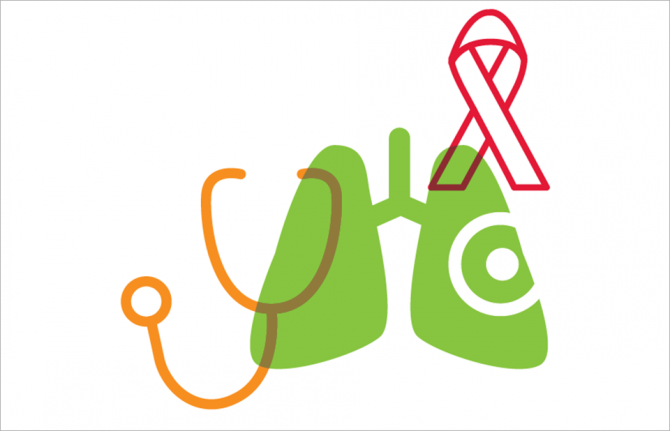
Press Statement
Impact of COVID-19 hits hard as TB deaths among people living with HIV rise for the first time since 2006
23 March 2022 23 March 2022On World Tuberculosis Day 2022, UNAIDS is calling for urgency in diagnosing and treating TB as TB deaths among people living with HIV rise for the first time after years of progressive decline
GENEVA, 23 March 2022—Tuberculosis (TB) is the leading cause of death among people living with HIV, accounting for around one third of AIDS-related deaths globally. Coordinated and scaled up efforts to prevent, diagnose and treat the two diseases had resulted in a 68% decline in TB deaths among people living with HIV between 2006 and 2019. However, in its 2021 Global Tuberculosis Report, the World Health Organization announced that TB deaths among people living with HIV increased for the first time in 13 years, from 209 000 in 2019 to 214 000 in 2020.
“The increase in TB deaths among people living with HIV is alarming and demonstrates the fragility of pandemic progress,” said Winnie Byanyima, Executive Director of UNAIDS. “When COVID-19 hit, global attention on HIV and TB shifted as the world focused on tackling the new pandemic. This has meant lives needlessly lost and important targets missed for HIV, TB and other diseases. Urgent action and increased investments are needed to get us back on track.”
People living with HIV are 18 times more likely to develop TB disease. Although around 85% of people who develop TB disease can be successfully treated, the treatment success rates for people living with HIV are much lower, at around 77%. This demonstrates the importance of scaling up prevention efforts as well as treatment for the two diseases.
Concerted and collective action in this area has saved lives in recent years. Between 2018 and 2020, some 7.5 million people living with HIV were given preventive TB treatment, surpassing the global target of 6 million. But much more needs to be done to address the underlying inequalities that continue to fuel the spread of HIV and TB.
Refugees and displaced people are at particularly high risk of developing TB. At the end of 2020, the Office of the United Nations High Commissioner for Refugees estimated that 82.4 million people around the world were displaced from their homes. The war in Ukraine has already forced 3.5 million people to flee the country and millions more are internally displaced. It is critical that Ukraine and its neighbouring countries receive urgent support to provide essential health services for people affected by the war, including services for TB and HIV.
“In this time of crisis, there is an opportunity to build a pandemic-resilient future if leaders work together to tackle the inequalities that endanger us all,” said Ms Byanyima. “While AIDS, TB and COVID-19 each spread in unique ways, we are watching as each is driven by social and economic inequality that leaves some communities more vulnerable and the whole world at risk. We can address those inequalities, or we can let these pandemics continue—the power is in our hands.”
The Global Fund to Fight AIDS, Tuberculosis and Malaria (Global Fund) is the leading international funder of TB programmes; however, COVID-19 has had a devastating impact. Between 2019 and 2020, the number of people treated for TB in the countries where the Global Fund invests fell by around 1 million. This year, at its seventh replenishment, the Global Fund is calling for an additional US$ 18 billion to save 20 million lives and get the world back on track towards ending HIV, TB and malaria. To end the three diseases by 2030 and build strong national health systems to respond to emerging pandemics, it is essential that the Global Fund be fully funded.
UNAIDS is continuing to work with partners to reach the HIV/TB targets set for 2025, which include ensuring that 90% of people living with HIV receive preventive treatment for TB and reducing TB-related deaths among people living with HIV by 80% (from a 2010 baseline). To make this happen will require the Global Fund to be fully funded and that investments be made in research and development, in expanding services as well as in adopting new and innovative strategies to reach everyone in need.
UNAIDS
The Joint United Nations Programme on HIV/AIDS (UNAIDS) leads and inspires the world to achieve its shared vision of zero new HIV infections, zero discrimination and zero AIDS-related deaths. UNAIDS unites the efforts of 11 UN organizations—UNHCR, UNICEF, WFP, UNDP, UNFPA, UNODC, UN Women, ILO, UNESCO, WHO and the World Bank—and works closely with global and national partners towards ending the AIDS epidemic by 2030 as part of the Sustainable Development Goals. Learn more at unaids.org and connect with us on Facebook, Twitter, Instagram and YouTube.
Contact
UNAIDS GenevaSophie Barton-Knott
tel. +41 79 514 68 96
bartonknotts@unaids.org
UNAIDS Media
communications@unaids.org
Our work

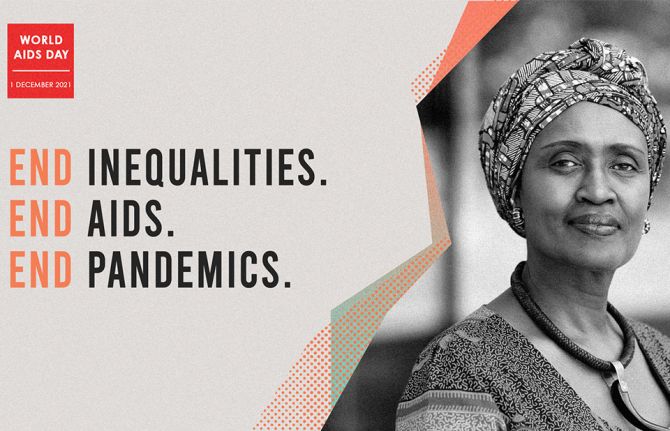
Press Statement
World AIDS Day 2021 message from UNAIDS Executive Director Winnie Byanyima
01 December 2021 01 December 2021Dear friends,
Greetings on this World AIDS Day, and my solidarity with all around the world as we confront the impact of colliding pandemics.
This year, the world agreed on a bold plan that, if leaders fulfil it, will end AIDS by 2030. That’s so exciting.
But today we, as the Joint United Nations Programme on HIV/AIDS, issue a stark warning. AIDS remains a pandemic, the red light is flashing and only by moving fast to end the inequalities that drive the pandemic can we overcome it.
Where leaders are acting boldly and together, bringing together cutting-edge science, delivering services that meet all people’s needs, protecting human rights and sustaining adequate financing, AIDS-related deaths and new HIV infections are becoming rare.
But this is only the case in some places and for some people.
Without the inequality-fighting approach we need to end AIDS, the world would also struggle to end the COVID-19 pandemic and would remain unprepared for the pandemics of the future. That would be profoundly dangerous for us all.
Progress in AIDS, which was already off track, is now under even greater strain as the COVID-19 crisis continues to rage, disrupting HIV prevention and treatment services, schooling, violence prevention programmes and more.
On our current trajectory, we aren’t bending the curve fast enough and risk an AIDS pandemic lasting decades. We have to move faster on a set of concrete actions agreed by United Nations Member States to address the inequalities that are driving HIV.
Through fighting the AIDS pandemic, we have learned a lot about what we need more of for AIDS and for all pandemics.
We urgently need sufficient community-led and community-based infrastructure as part of a strong public health system, underpinned by robust civil society accountability.
We need policies to ensure fair and affordable access to science.
Every new technology should reach each and everyone who needs it without delay.
We need to protect our health workers and expand their numbers to meet our urgent needs.
We must protect human rights and build trust in health systems.
It is these that will ensure we close the inequality gaps and end AIDS. But they are too often applied unevenly, are underfunded and are underappreciated.
I salute the front-line communities that have pioneered the approaches shown to be most effective, that have driven the momentum for change and that are pushing leaders to be bold. I urge you: keep pushing.
World leaders must work together urgently to tackle these challenges head-on. I urge you: be courageous in matching words with deeds.
There is not a choice to be made between ending the AIDS pandemic that is raging today and preparing for the pandemics of tomorrow. The only successful approach will achieve both. As of now, we are not on track to achieve either.
If we take on the inequalities that hold back progress, we can deliver on the promise to end AIDS by 2030. It is in our hands.
Every minute that passes, we are losing a precious life to AIDS. We don’t have time.
End inequalities. End AIDS. End pandemics.
Thank you.
UNAIDS
The Joint United Nations Programme on HIV/AIDS (UNAIDS) leads and inspires the world to achieve its shared vision of zero new HIV infections, zero discrimination and zero AIDS-related deaths. UNAIDS unites the efforts of 11 UN organizations—UNHCR, UNICEF, WFP, UNDP, UNFPA, UNODC, UN Women, ILO, UNESCO, WHO and the World Bank—and works closely with global and national partners towards ending the AIDS epidemic by 2030 as part of the Sustainable Development Goals. Learn more at unaids.org and connect with us on Facebook, Twitter, Instagram and YouTube.

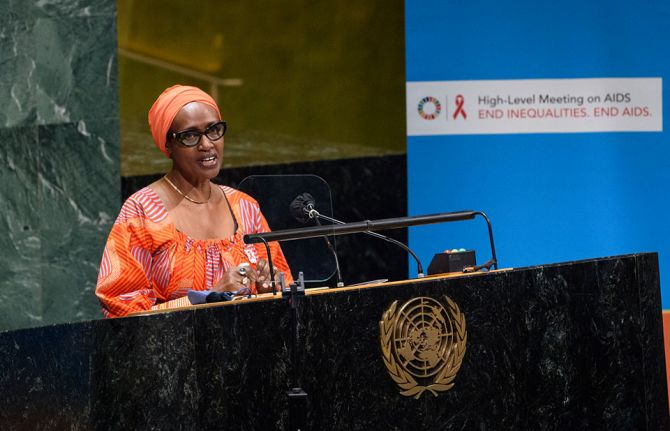
Opinion
How to end the AIDS epidemic in western and central Africa
31 October 2021
31 October 2021 31 October 2021By Winnie Byanyima, UNAIDS Executive Director
The AIDS epidemic in western and central Africa is an ongoing emergency. The early gains made against HIV in this region have not been translated into the sustained progress that has been made in other parts of sub-Saharan Africa.
Last year, there were 150 000 AIDS-related deaths in the region, and 200 000 people became newly infected with HIV. Every week more than 1000 adolescent girls and young women aged 15–24 years become infected with HIV in the region; 1.2 million people in western and central Africa are still waiting to initiate life-saving HIV treatment. Only 35% of children living with HIV in western and central Africa are on treatment.
Now the COVID-19 crisis has obstructed services and exacerbated the inequalities that drive the AIDS epidemic. If we don’t act now, not only will many more lives be lost, but containing the AIDS pandemic will be more difficult and expensive in the coming years.
Ending AIDS is achievable: there is a tested set of approaches that are proven to work, including in challenging settings.
From Cabo Verde’s leadership on the elimination of vertical transmission of HIV, to Cameroon’s decision last year to eliminate user fees for all HIV services at public health facilities and accredited community sites, examples that light the way are already there. By aligning policy with the evidence of what has succeeded, we can end AIDS as we promised.
Countries and communities are already leveraging the experience and expertise of the AIDS response to reduce the impact of COVID-19 across this region. From Côte d’Ivoire, to Guinea, to Senegal, public health authorities, international organizations, civil society actors and communities of people living with and affected by HIV have worked together to ensure that people living with HIV continue to receive their medication, to deliver care and prevention services in safe and innovative ways, to deliver food to people who have lost their incomes in lockdown, to convey messages about the importance of hygiene and social distancing in order to stay well and to dispel myths that feed stigma and discrimination and weaken public health messaging.
This spirit of cooperation and partnership is vital for stronger pandemic responses.
This week, hosted by the President of Senegal, Macky Sall, UNAIDS and the Civil Society Institute for HIV and Health in West and Central Africa are organizing a summit in Dakar on how to close the gaps in the region’s HIV response and strengthen pandemic preparedness.
Here are three of the bold actions we need to take.
First, embrace and enable communities to be at the centre of planning and delivery.
Communities know the situation on the ground—they must be given the resources and the space to lead. Countries need to ensure an enabling environment for communities to be involved in providing services as an integral part of the public health response, be involved as co-planners, be able to highlight experiences and concerns and be able to play their essential role ensuring accountability.
Countries need to lift those legal, policy and programmatic barriers that hold this back, and to scale up financial support to unleash the incomparable contribution of communities.
Second, increase investment.
Countries need to increase the scale of provision in prevention, testing and treatment and eliminate all financial barriers to ensure universal access to services.
The Abuja commitment to invest 15% of government budgets in public health needs to be met. Joint commitments made by health and finance ministers at the Africa Leadership Meeting to increase domestic revenues dedicated to health must be fulfilled.
International donors too have to step up with support at the time of the worst crisis in decades. Enabling the required fiscal space will require debt cancellation to support governments in scaling up investments in health and in tackling the social drivers of HIV and pandemic risk.
International action to prevent harmful tax competition and illicit financial flows is likewise key. It is difficult to advance towards fair and progressive taxation, and grow revenues, when large corporations and high-net-worth individuals are systemically enabled internationally to evade the taxes the ordinary citizen must pay, and which are essential for health, education, social protection and economic investment.
Third, address the inequalities that drive the epidemic.
COVID-19 has once again shown the world how epidemics thrive on inequalities, both between countries and within them. The new UNAIDS strategy adopted earlier this year puts the fight to end inequalities at the centre of the mission to end AIDS.
Inequalities drive HIV. Vulnerable groups of people represent 44% of new HIV infections in western and central Africa. Their partners represent a further 27%.
The ECOWAS Strategy for HIV, TB, Hepatitis B & C and Sexual and Reproductive Health and Rights among Key Populations puts it so well:
“the protection of human rights for all members of each key population is crucial to success. Laws that discriminate or create barriers should be reformed, to ensure that key populations are free from stigma, discrimination and violence and their vulnerability to HIV is reduced.”
Gender inequality likewise drives HIV: of the new HIV infections among young people in western and central Africa, almost three quarters are among adolescent girls and young women. The issue is power.
Research shows that ensuring that girls complete secondary education reduces their risk of acquiring HIV by up to half, and that combining this with a package of services and rights for girls’ empowerment reduces their risk further still.
The Education Plus initiative, co-convened by UNICEF, UNESCO, UNFPA, UN Women and UNAIDS, with governments, civil society and international partners, is helping to accelerate the actions and investments needed to ensure that every African girl is in school, safe and strong.
What we need to do to end AIDS is also what we need to do to enable Africa to rise.
Governments, international organizations, scientists, researchers, community-led organizations and civil society actors cannot be successful alone, but together they can create an unbeatable partnership and an unstoppable force to end AIDS as a public health threat by 2030.

